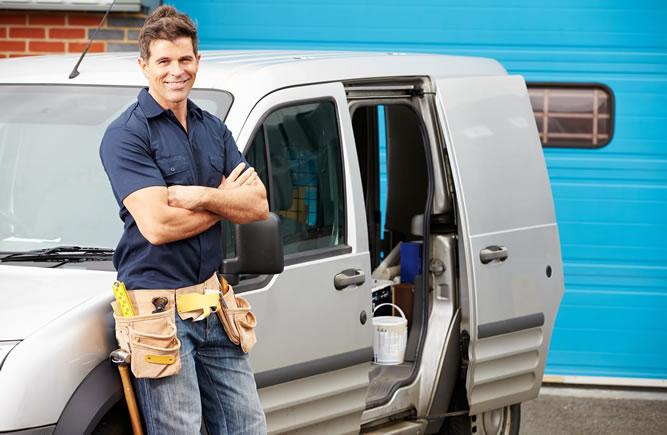French Door Installation Cost
Last updated 2nd July, 2025
Want to know how much it will cost to fit double French doors?
In this guide, you'll find everything you need to know about the average costs (which can start from £500 upwards) of installing french patio doors, including uPVC double doors, composite French doors, and double glazed double doors.
Take a look below for more information!
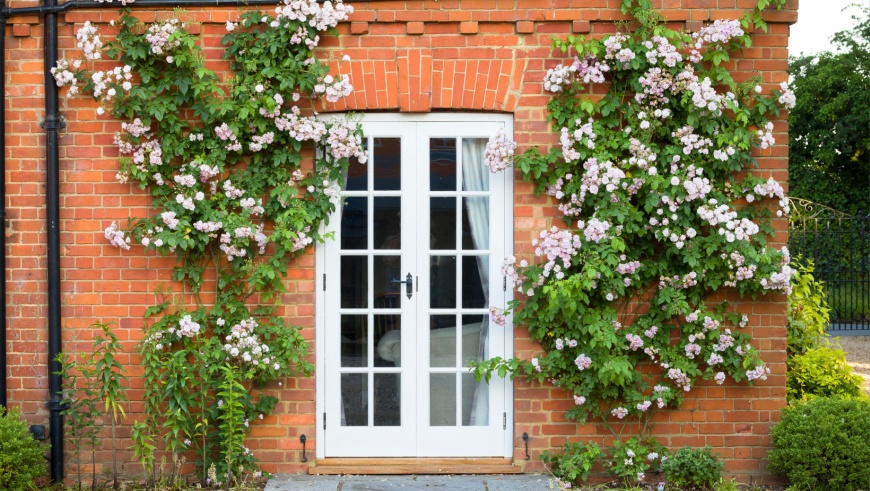
Table of Contents
- How much to install French doors?
- How much are French doors? (supply only)
- Labour costs to install French doors
- How long does installing French doors take?
- Factors that impact French door fitter costs
- What are French doors?
- What does installing French doors involve?
- DIY installing French doors
- Choosing French doors
- Alternatives to French doors
- Cost of removing French doors
- FAQs
- How to find and hire a French door installer
How Much to Install French Doors?
The cost of installing French doors will mainly depend on their size and the materials that they are constructed from.
Without the addition of sidelights (which are vertical glazed panels which can be fitted on either side of your door), the maximum size for installing French doors is 1800mm, which can cost between £850-£2500 depending on the material.
There is not only a variety of French doors available, but also a wide price range to choose from. Usually, a tradesperson will also charge around £150 to £200 per day to install French doors.
This may vary according to the complexity of the work or the size of the doors. In some cases, there may be a requirement for a load-bearing lintel (if modifying or creating an opening) for the doors to be installed.
This is additional work which should be discussed beforehand to ensure it is being completed as part of the tradesperson's quote for the work. If not, this could be an additional cost and may even require a consultation from a structural engineer to ensure the correct lintel is installed.
French Door Fitting Prices
French door fitting costs will mainly depend on the size of the door and the type of material that you want the frame to be made from.
For reference: the usual size in the UK for French doors are 1200mm, 1500mm, and 1800mm wide and normally 2100mm high. It's possible to have bespoke sizes constructed, but this will lead to higher-than-normal supply costs.
The prices below also assume you're opting for double glazed French doors with no extra features (e.g., sidelights).
| Size | uPVC | Timber | Composite | Aluminium |
|---|---|---|---|---|
| 1200mm x 2100mm | £500-£800 | £1300-£1700 | £1100-£1600 | £2100-£2600 |
| 1500mm x 2100mm | £600-£900 | £1450-£1900 | £1250-£1700 | £2250-£2750 |
| 1800mm x 2100mm | £900-£1200 | £1600-£2100 | £1400-£1900 | £2400-£2900 |
How Much Are French Doors? (Supply Only)
Let's start by taking a top-level look at how much French doors cost to buy in the UK.
After, we'll break down the costs for different sized French doors made using different materials.
| Material | Average Price | Benefits |
|---|---|---|
| uPVC | £550-£750 | Affordable and low maintenance |
| Timber | £1,100-£1,350 | Natural look and a good insulator |
| Composite | £900-£1,200 | Durable and weather-resistant |
| Aluminium | £1,850-£2,200 | Lightweight and versatile for bespoke fittings |
French doors are made in several different types of material, such as uPVC, timber, composite, and aluminium.
In the UK, French doors made from uPVC are the most popular and cost-effective choice, priced between £550-£750, although installation costs, furniture, glazing and trim will be extra.
The price of timber French doors is usually between £1100-£1350 but will vary depending on whether you choose hardwood or softwood. Hardwood is more durable but often more expensive.
Composite material such as glass-reinforced plastic is also becoming popular, and the cost of French doors made from this material is around £900-£1200. They will either have a wooden or compressed foam interior with a glass-reinforced skin.
Aluminium is another popular material for doors and windows due to its strength, durability and adaptability to bespoke shapes and designs. A set of French doors made from aluminium will cost on average £1850-£2200.
In the tables below, we've taken a closer look at how much French doors cost if you buy them yourself.
Cost for 1200mm x 2100mm French Doors
| Type | Cost |
|---|---|
| uPVC | £450-£650 |
| Timber | £800-£1000 |
| Composite | £700-£900 |
| Aluminium | £1500-£1700 |
Cost for 1500mm x 2100mm French Doors
| Type | Cost |
|---|---|
| uPVC | £550-£750 |
| Timber | £900-£1200 |
| Composite | £800-£1000 |
| Aluminium | £1600-£1800 |
Cost for 1800mm x 2100mm French Doors
| Type | Cost |
|---|---|
| uPVC | £650-£850 |
| Timber | £1100-£1400 |
| Composite | £900-£1100 |
| Aluminium | £1700-£2000 |
French Door Installation Cost Breakdown Calculator
Breakdown of what it'll cost to install a 1200mm x 2100mm uPVC French door.
Total Cost: £800
Materials
£520
Installer
£280
Waste Removal
£0
Labour Costs to Install French Doors
Labour costs make up around 30-40% of the price of French door installation.
The cost of installing French doors in your home will include the price of the doors and the cost of the labour to fit them.
This kind of work is normally done with a team of two, a main fitter and a labourer or secondary fitter. A tradesperson will charge between £150-£200 per day while a labourer will cost around £80-£100 per day.
Expect to pay between £250-£300 per day in total for labour to install new French doors. This price will vary according to the type and size of doors being installed, the company carrying out the work and the region of the UK that you live in.
It is possible to pay a company to supply and fit new French doors in your home, and all the associated costs such as delivery, installation and clean up afterwards will be included in this price.
Alternatively, you could supply the doors yourself and hire an independent fitter to install them. If you follow this route make sure that you are confident about measuring the doors as once they have been ordered you will be committed and any errors will be down to you when it comes to fitting them.
How Long Does Installing French Doors Take?
One set of French doors should take no more than a day to fit for a professional installation company, even if you are replacing old doors or a window.
If a brand new opening needs to be made in which to install the doors, then this process may take longer but a good company will not leave your home exposed to the elements or security issues overnight and should supply enough labour and planning to get the job done in one day.
The size and complexity of the installation will potentially impact the timeframe required, and while a minimum of two people are needed for the work, more than two will speed up the process and get the job completed quicker.
Factors That Impact French Door Fitter Costs
There will be several factors which will influence the cost of installing French doors, some of which you have influence over and some which you will not.
Property Location
Location is always a contributing element to the price of any home improvement as most homeowners are aware.
Those living in London and the south-east of the UK are resigned to paying a premium for most things, and home improvements are no exception.
Prices in some large cities may be higher than in smaller towns, with the Midlands and the north of the country potentially cheaper.
Installation Area
The area of your French door installation may affect the price that you pay.
A pair of French doors installed on a first-floor balcony will involve more labour and be more complex than a ground-level project.
Choice of Material
The type of doors you choose to have fitted, such as timber, uPVC, composite, or aluminium, will also contribute to the cost.
Aluminium is the most expensive option, with timber a close second.
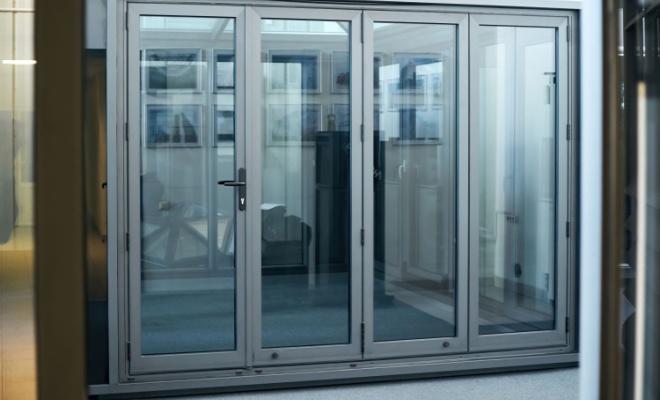
Composite material doors are becoming popular due to their durability, and low maintenance and uPVC doors are still a strong favourite with the lowest price tag.
Access
Access to your property may cause extra charges if you are living in a particularly remote or rural area.
You may be restricted in companies that service your location and not have a wide choice of installers to choose from.
Size of French Doors
The size of the French doors installed in your home will have an impact on the overall cost.
Not only the additional bulk to be fitted but the extra labour required will potentially add to the price of your installation.
Larger doors will need more hands to safely manoeuvre and install correctly, so bear this in mind when you are budgeting.
What are French Doors?
Traditionally, French doors are two identical doors hung side-by-side normally open outwards. They are usually fully glazed to allow maximum light into the house although they are available with beading and panels in various designs.
Origin of French Doors
Despite their name French doors were actually an imported Italian concept from around the time of the Renaissance, and their symmetry is typical of Italian architecture of the 16th and 17th century.
They were originally double wooden doors often giving access to a balcony and later with the development of glass were used to provide extra light into the home.
Popularity and Benefits of French Doors
French doors and patio doors have been popular for decades in the UK and provide a link between rooms internally or from the interior of the house to the garden.
Below we take a brief look at just some of the benefits when investing in the cost of French doors, making them a fantastic opportunity to enhance your home:
- Increase the amount of natural light in your home
- Provide greater access to your garden and outdoor areas
- Create open space ideal for entertaining
- Improve energy efficiency with double glazed doors
- Reduce the amount of outside noise with sound-proofing
- Add an aesthetic appeal to your property
- Potentially increase the value of your house
- Easy to maintain and a long-lasting addition
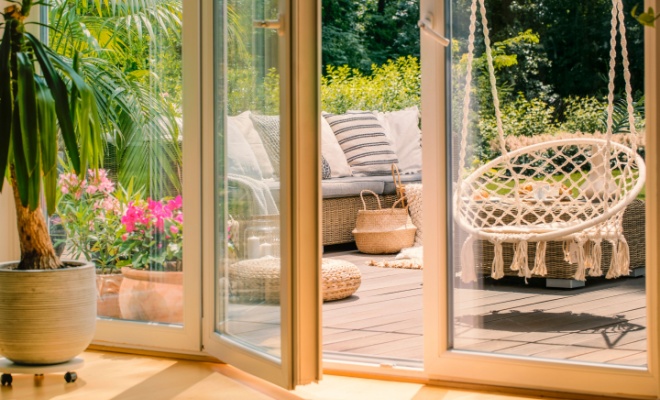
As there are so many styles and designs available French doors are equally suited to period or modern homes.
They also have to meet certain standards so you can be assured that they are energy efficient.
In the UK, the most common French doors are made from uPVC, though other materials such as aluminium and timber are also available albeit at an increased cost.
The security of modern French doors is of a very high standard thanks to multi-lock systems, and many manufacturers offer doors which have passed the PAS024 security testing.
French doors are great for providing a traditional option of garden doors, but they are also popular when used inside the home to separate two rooms.
French windows and French doors are exactly the same thing, other than the way they are used.
Some people refer to them as a door, and others call it a window.
They can be installed in a variety of openings but are most often fitted to replace a window or existing patio doors.
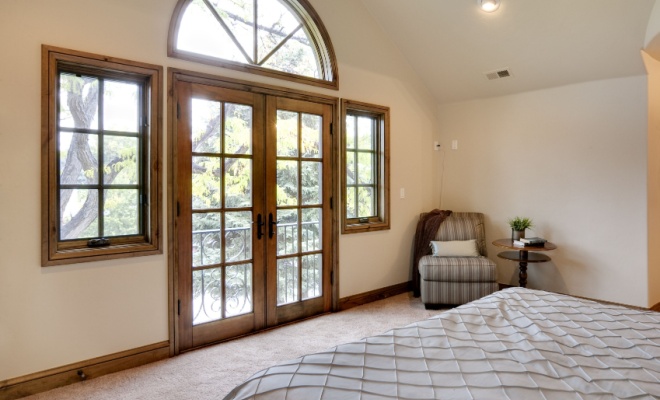
You can, of course, make a completely new opening for French doors, although this will obviously be more expensive.
Many choose to replace their old patio doors with a set of period French doors, but this really depends just on your personal preference and budget.
What Does Installing French Doors Involve?
When it comes to improving the rear of your property, a new patio or French doors can be a key feature.
Not only do they provide light and convenient access, they open up the room to the garden whilst also offering great security.
The term "patio doors" is often used for any kind of door that opens onto a patio, though traditionally it referred exclusively to sliding patio doors. Now it is used for bi-fold doors and French doors as well as sliding doors.
French doors are best used with smaller openings, and their design typically opens outwards into the garden.
French doors also work well in the UK as in bad weather you have the option to open just a single door for access, but when the sun is shining, both doors can be opened out wide to great effect.
If you buy French doors from a double-glazing or joinery company, they will usually take care of all measurements for you to ensure a proper fit.
By ordering online, you are taking measurements yourself, and these will need to be exact and to the manufacturer’s specifications.
If they are not, you risk getting doors which do not fit correctly and cannot be returned.
Simply measuring the gap that the doors will fit into is not sufficient for the manufacturer as the style and function options can affect the measurements.
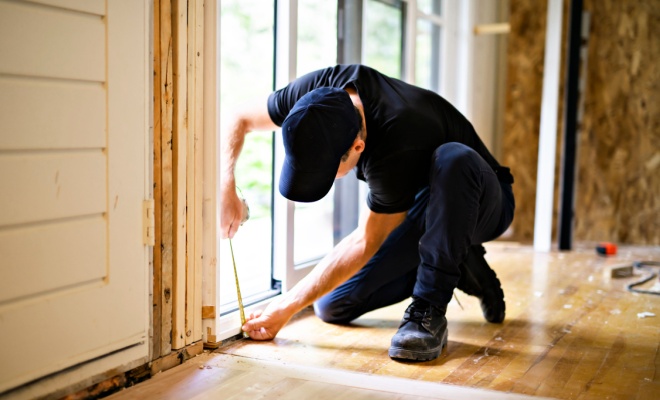
It is vital you understand exactly how to take measurements when ordering French doors online to avoid expensive mistakes.
If the installation requires a completely new opening, then the timeframe and cost will increase.
French doors are perceived as being less weatherproof than patio doors, but this is a misconception. If French doors are secured and sealed properly, you should not have any problems. When fitting, you do need to make sure the gaps are sealed correctly, though.
If you find the seal is not tight enough, you can adjust the door or caulk any gaps. If the gaps are too large for caulk, you can install a foam backer rod then caulk both edges to completely seal any gaps.
However, if you are having made to measure doors professionally fitted, you can reasonably expect all gaps to be minimal, and once the doors are hung and adjusted, they should be completely weather and draughtproof.
DIY Installing French Doors
Unless you have undertaken major works in a DIY capacity and have previously installed an external door, then this project is best left to a professional.
Not only is it heavy and time-consuming work but if it is done incorrectly, then you could leave your home vulnerable with badly fitted doors.
You will need at least one other person to help as the doors cannot be handled alone safely and a comprehensive list of tools and safety equipment.
The dangers of trying to do this job by yourself include crush injuries, cuts, and falls from height if installing at first-floor level.
The potential for injury is mitigated by having someone to help with lifting and manoeuvring the doors.
It will also be necessary for you to inform your local authority that you are installing new external glazing.
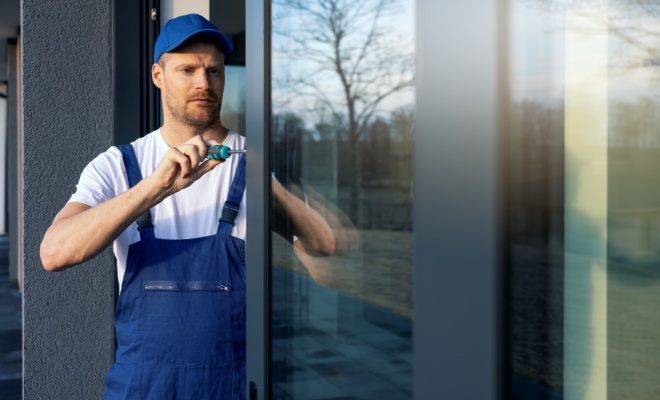
This is in order to meet Building Regulations, so the work will need to be checked and signed off by them to confirm that it complies.
Any external glazing is a ‘controlled fitting’ and requires inspection and a compliance certificate.
Professional installers can self-certify and therefore, do not need to call the local council for every installation.
However, if you do the work yourself, then you will need to have a FENSA certificate to prove that the new French doors meet thermal, safety and security standards.
FENSA stands for Fenestration Self Assessment and, in short, means that the installed windows or doors fulfil all the requirements of the Building Regulations that apply to them.
Tools Required for DIY Installation
To carry out the work of installing new French doors yourself, you will need the following tools:
- Electric drill
- Various drill bits
- Crosshead screwdriver
- Flathead screwdriver
- Carpenter square
- Hammer
- Hole cutter
- Nail bar
- Pad saw
- Rubber mallet
- Level
- Utility knife
- Nail punch
- Tape measure
- Chisels
Safety Equipment Needed for DIY Installation
You will also need to wear the following personal protection equipment:
- Safety glasses
- Gloves
- Steel capped boots
If you are removing old French doors or a window in order to install new doors, then you could save money by taking these out yourself.
However, this should be done with care and caution as there may be structural issues, especially if replacing a window with a pair of French doors.
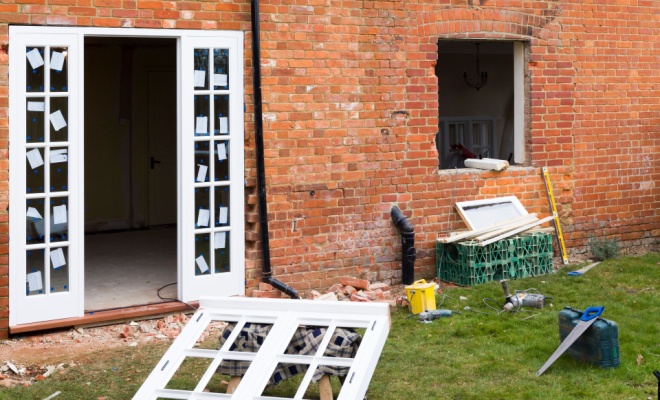
The lintel will need to be replaced with a wider one to support the floor above the new opening.
Installing new French doors yourself will save you the cost of labour which on average would be £300-£500.
However, the cost of badly or incorrectly fitted doors could cost much more overall so carefully weigh up the pros and cons of doing this job as a DIY project before deciding.
Choosing French Doors
French doors are distinct from other ‘patio’ doors as they are always a pair of glazed doors that are side hinged and open outwards.
However, there are many styles and designs available in this format and a variety of materials from which they are made.
uPVC French Door Cost
Probably the most common material for French doors is uPVC.
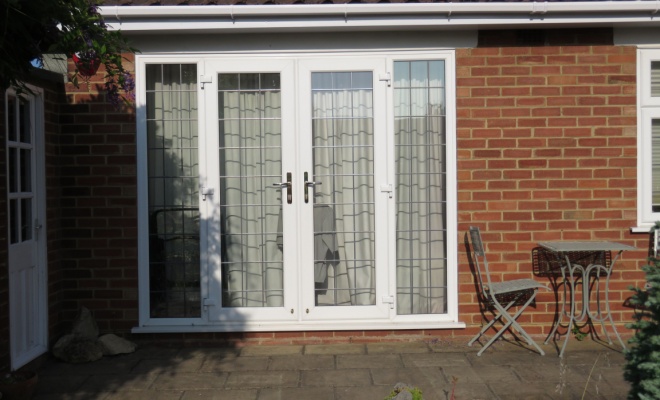
As with double glazed windows, uPVC is a popular material due to its relatively low price, durability, and easy maintenance.
Pros of uPVC French doors:
- ✔ Extremely versatile material
- ✔ Available in a wide variety of finishes such as woodgrain effect
- ✔ Long-lasting and low maintenance
Cons of uPVC French doors:
- ✖ Can look ‘budget’ compared to other materials
- ✖ uPVC is not as resistant to scratches as aluminium or composite doors
- ✖ Sunlight can cause fading in uPVC
The average cost of uPVC French doors is between £550-£750.
Timber French Door Cost
Timber French doors are the closest to the original doors that were their inspiration.
Before the advent of glass production, French doors were wooden double doors which usually opened up onto a balcony.
Today timber French doors are glazed to allow maximum light into a property.
Pros of timber French windows:
- ✔ Aesthetically probably the best material for French doors
- ✔ Hardwood doors are very durable and strong
- ✔ Can be painted to match the decor of the house
Cons of timber French windows:
- ✖ One of the more expensive material options
- ✖ Will require more maintenance to retain optimum appearance and performance
- ✖ Regular re-decoration to maintain the best appearance
The average cost of timber French windows is £1100-£1350.
Composite French Door Cost
The term composite comes from the fact that the door is composed of different constituent elements.
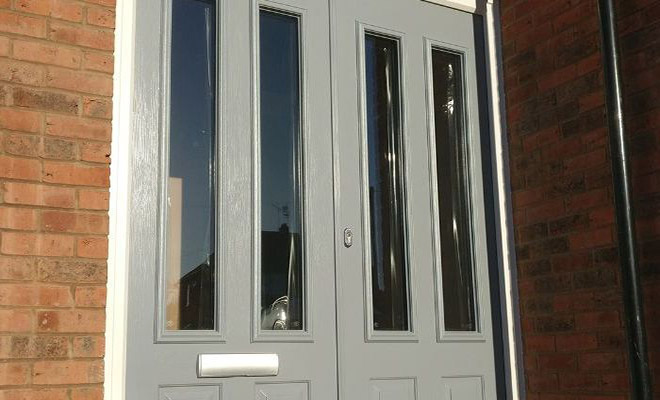
Most composite doors are a combination of a glass-reinforced plastic shell around a solid wooden core or polyurethane foam with uPVC edging.
Pros of composite French doors:
- ✔ Extremely strong and durable
- ✔ Available in a wide range of styles and designs
- ✔ Enhanced security and insulation properties
Cons of composite French doors:
- ✖ Relatively expensive compared to uPVC
- ✖ Can ‘creak’ when heated up by sunlight
- ✖ Not all composite doors can be recycled
The average cost of composite French doors is between £900-£1200.
Aluminium French Door Cost
As a material for windows and doors, aluminium has become increasingly popular in recent times, and this includes French doors.
Pros of aluminium French doors:
- ✔ Lightweight but strong material
- ✔ Slimmer frames and larger glazed areas for more light
- ✔ Wide range of colours available
Cons of aluminium French doors:
- ✖ The most expensive material option
- ✖ Not as authentic as timber French doors
- ✖ Aluminium windows & doors can be prone to condensation
The average cost of aluminium French doors is between £1850-£2200.
Alternatives to French Doors
French doors are distinct in style and identifiable as glazed double doors which divide rooms internally or give access to the garden or patio.
To call them patio doors is not strictly correct as this term is normally used to refer to sliding doors.
In recent years bi-fold doors have begun eclipsing sliding doors in popularity as they offer a wider unobstructed opening.
Sliding Door Cost
Sliding doors have been an alternative to French doors for a while and also come in uPVC, timber, and aluminium.
While uPVC is one of the least expensive options, it is not as strong as aluminium, and therefore the frames tend to be quite bulky.
Aluminium frames are not only strong but can also provide slimmer frames and profiles.
Hardwood and engineered timber sliding doors offer strength and an aesthetically pleasing alternative to French doors.
Pros of sliding doors:
- ✔ Can be installed in wider openings where French doors would be unsuitable
- ✔ Larger expanse of glass giving better sightlines of the exterior
- ✔ Suitable for narrow space where hinged doors would impinge on the outside
Cons of sliding doors:
- ✖ Both doors cannot be opened simultaneously
- ✖ uPVC frames need to be thick to support the weight of the door and look bulky
- ✖ Some styles can be quite heavy to operate for the elderly or the young
The cost of sliding doors will depend on the size and the material.
uPVC doors will cost on average around £1000-£2200 while aluminium will cost between £1600-£3500.
Bi-fold Door Cost
Bi-fold doors have become very popular in recent times being featured on various home improvement programmes as an alternative to other patio doors.
They offer the option of expanses of glazing which cover larger areas than sliding and French doors.
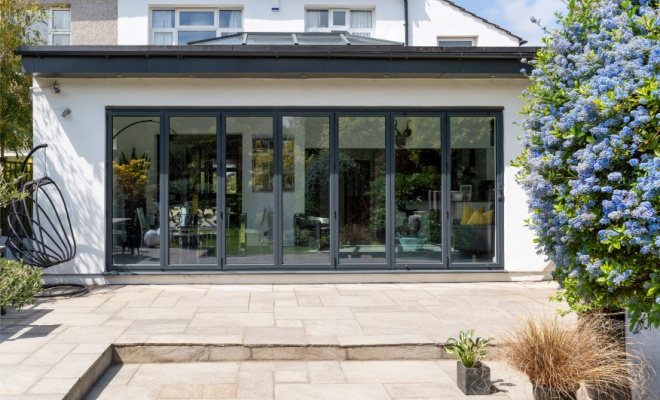
Bi-fold doors fold back on themselves in a concertina style, meaning that there are no obstructions in the aperture.
The doors are then stored perpendicular to the frame in the corner of the opening.
Pros of bi-fold doors:
- ✔ Capable of spanning a large opening at the rear of a property
- ✔ Can be fully opened, creating a whole wall of access to the garden
- ✔ Many come with flush threshold meaning there is nothing to step over
Cons of bi-fold doors:
- ✖ When panels are folded back, they need to be stored at the side of the opening
- ✖ No ‘traffic’ door meaning the whole door needs to be opened for access to the outside
- ✖ There is a bigger frame to glass ratio than sliding doors
The cost of bi-fold doors will vary depending on the size and the material that they are made from.
uPVC bi-fold doors can cost between £1700-£4500 while aluminium can cost from £2500-£5500.
Cost of Removing French Doors
Older French doors which are no longer secure or energy-efficient may prompt you to remove them or perhaps you just do not like them.
Although this can be done DIY, albeit with help, it is probably best to contact a professional builder to do this work for you.
If you have replacement windows or doors, then the installer can remove the French doors for you as part of the work.
Most installers will charge between £200-£300 a day for labour as it will require more than one person to take the doors out.
Removing French Doors
Taking French doors out is relatively straightforward as long as it is done carefully and methodically.
Removing the bottom and top hinges first and the middle hinge last helps distribute the weight evenly while you work.
The doors can then be taken off the frame.
To remove the frame, the fittings in the sides should be removed, and the frame gently but firmly prised away from the walls.
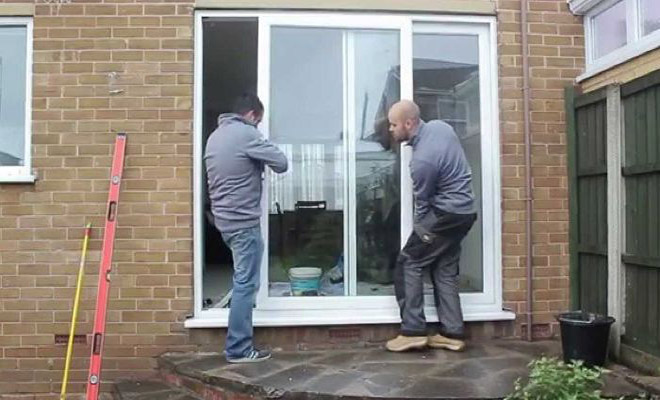
Working carefully and slowly should ensure that no damage occurs to the opening as this may affect any new doors being installed.
Disposal of French Doors
If your installer is taking out your old doors, then they may take them away to be recycled, or if you are removing them yourself, you could contact a reputable recycling company to dispose of them for you.
The price you pay will depend on the material you are disposing of uPVC, aluminium or timber, and you should ask what the cost will be before committing yourself.
FAQs
However, it is possible to add sidelights to the opening to allow more light into the property without overstretching the limits of the French doors. Other common sizes are 1200mm and 1500mm wide with most being 2100mm high.
Aluminium doors are very low maintenance and will only require wiping down with a weak detergent. Timber doors are aesthetically the most pleasing and give a sense of quality, and composite doors are probably the strongest and most secure.
Composite doors contain different constituent materials such as glass-reinforced plastic, steel frame and a solid timber core. It is this combination of different materials that make composite doors so strong and secure.
How to Find and Hire a French Door Installer
Some people may be confident about installing French doors themselves, and if they have done similar work before then, this is perfectly feasible although it will require at least two people.
Most people will prefer to hire a professional installer, and this is usually on a supply and fit basis where the doors are purchased along with the installation service.
You can buy the doors yourself and hire someone to fit them, but you should be very confident that you can accurately measure the doors.
Getting this part wrong can be a costly mistake and may delay installation if there are errors.
Finding a French Door Installer
In order to find a reputable French door installer, it is worth asking friends and family for recommendations.
This way, you can see the finished installation yourself and ask pertinent questions about the process and the standard of the work.
Cost to Hire an Installer
The price of labour to install French doors will be around £250-£300 per day, and most installations will only take one day unless it is a particularly large or complicated installation.
Of course, if you do it yourself, you will save this amount and only have to pay the price of the doors.
Qualifications and Experience
A professional installation company will have experience and relevant qualifications in window and door fitting, and these are the qualities you should be looking for.
They should also be FENSA registered and be able to self-certify all installations.
The FENSA accreditation means that those registered are competent to carry out the installation and fitting of windows and doors to the standards required under Building Regulations.
This is relatively easy to check on the FENSA website.
Anyone carrying out work in your home should have insurance such as public liability insurance or professional indemnity insurance and you are entitled to ask for proof of this.
